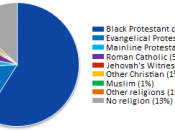Standard Written English vs. Standard Black English Professors, prescriptivists, descriptivists, and even everyday people have their own opinion of what they think common spoken English should sound like. David Foster Wallace, in his essay Tense Present, talks about different dialects of English used in the United States and how these different dialects relate to everyday life. This essay will discuss the Standard Written English, the Standard Black English, as defined in Wallace?s essay, and the realization of the need of a defined means of mass communication versus non-structured communication.
(Note: I will be referring to Standard Written English as Standard American English as it only seems fitting because Wallace references the Standard Written English as the defined American Norm, and Standard Black English will be referred to as American Black English as Wallace was speaking solely of the African American community here in the United States.) Standard American English is the skills, knowledge, and abilities that we are taught in school as children that set the baseline of societal communication, it is also linguistic good manners, sensitively and accurately matched to context?to listeners or readers, to situation, and/or to purpose.
All persons enrolled in public schools regardless of race, ethnic group, or economic background, are taught to write and speak in Standard American English. Through the course of time those raised with a severe lack of formal education, which tended to be African Americans, found ways to talk to others. This brought the rise of the American Black English dialect.
Then the question is ?What is American Black English?? American Black English is generally defined as a distinct sub-language, with its own grammatical structure, based on West African grammatical patterns with superimposed English vocabulary (forming a "pidgin"), deriving from the African American cultural experience and meeting the particular...


